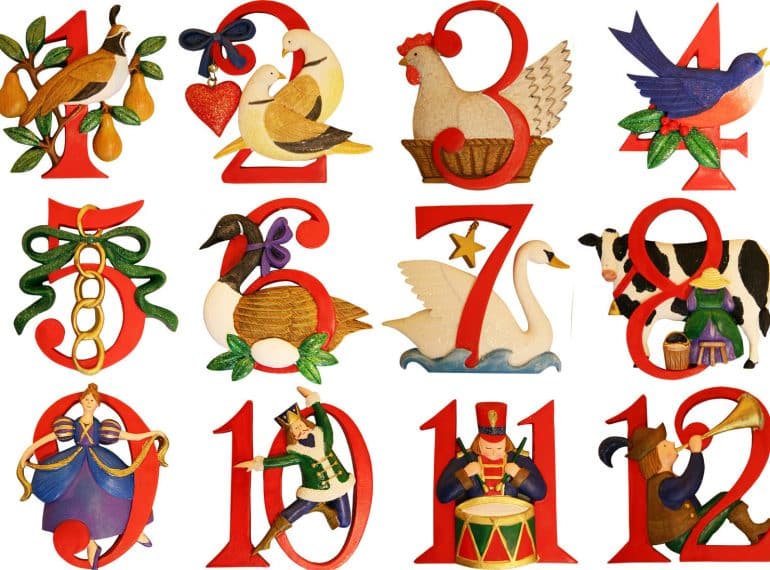
Speakers at the Maths in Action lectures introduced Sixth Form mathematicians to aspects of the subjects not necessarily covered in the A-level syllabus – and even enlisted the seasonal help of the song, The 12 Days of Christmas.
Sixty-five Year 12 boys attended the event at the Emmanuel Centre in Westminster, which was organised by The Training Partnership, an educational organisation specialising in study days at GCSE and Sixth Form level. This year’s lectures were:
- The 12 Days of Christmaths: Kyle Evans, maths musician, 2016 winner of the FameLab science communications competition
- How to build a 1,000mph car: Rob Bennett, Bloodhound SSC
- The Maths of weather and climate: Emily Shuckburgh, British Antarctic Survey
- Windmills of your mind: Dr Ben Sparks, University of Bath
- Closing the gap/ the quest to understand prime numbers: Dr Vicky Neale, University of Oxford.
 QE’s Head of Mathematics Jessica Steer said: “Each lecture was inspiring in its own way and has encouraged the boys to delve deeper into the topics they found most engaging on the day. These lectures are a very good way of introducing branches of Mathematics and ways of mathematical thinking not in the curriculum and of showing the range of applications to which the subject can be applied.”
QE’s Head of Mathematics Jessica Steer said: “Each lecture was inspiring in its own way and has encouraged the boys to delve deeper into the topics they found most engaging on the day. These lectures are a very good way of introducing branches of Mathematics and ways of mathematical thinking not in the curriculum and of showing the range of applications to which the subject can be applied.”
In his lecture, Kyle Evans investigated how many presents in total you receive from the song, The Twelve Days of Christmas. He demonstrated that the presents of which you would get the most were the ones in the middle of the song, on the sixth and seventh days (geese and swans respectively). He linked this to Diophantine equations, where the output must be a whole number. He also discussed Pascal’s Triangle and how one of the diagonals gives the total amount of presents you get each day.
QE delegate Adam Hassan said: “It was very engaging and interesting, as we were trying to work things out, rather than just listening to information – I also learned some good Maths tricks.”
Rob Bennett used his lecture – How to build a 1,000 mph car – to show how Mathematics can be used to solve problems. He talked about conventional wisdom and how humans continually push the boundaries by refining small features. He said that Mathematics will be used in the future to solve problems we do not even know exist yet.
“I liked this talk as I enjoyed the explanation about thermodynamics and how they have improved the car and the design of it,” said Year 12’s Dylan Vekaria.
In her lecture, Emily Shuckburgh, looked at mathematical modelling within the context of climate change, introducing the audience to a model where the Earth is assumed to be a ‘blackbody’ sphere (that is, one that absorbs all electromagnetic radiation falling on it), in order to estimate the surface temperature of the Earth. This model gives an under-estimate, but it is quite close to the true value, she said. A further model introduced an atmosphere and, more importantly, the effect of greenhouse gases, resulting in an estimate of the Earth’s surface temperature that is very close to the true value. She thus showed how this emphasised the importance of starting with a simple model at first and then building up to more complicated, more realistic models.
“The Maths of weather and climate showed effectively how easily understood ideas can be used to build complex mathematical models of real-world phenomena,’ said QE sixth-former Vincent Tang.
In his lecture, Ben Sparks started with the assertion that circles and spirals are everywhere in Mathematics, even though sometimes they are hidden at first. He then moved on to a discussion about rational and irrational numbers. He also talked about the mathematician, Mandelbrot, who decided to start at zero, square it and then add a constant over and over again. He explored what happened with different constants and whether or not the path of each constant converged to zero. The result was the Mandelbrot set, which boys were shown on the projector. Ben zoomed in on one section, but the shape never changed. Instead it kept repeating itself even after being zoomed in. Eventually, the computer was unable to zoom in any further, but this was due to the computer’s lack of ability to do so, rather than the shape of the set, Ben explained. The concluding message was that sometimes we should do Mathematics just because it is “cool and interesting”.
QE attendee Alejandro Lynch Gonzalez said: “I liked Windmills of your mind as it emphasised the beauty of Maths. I found it was the most engaging in terms of looking at the bigger picture and seeing how Mathematics is universal in its laws and properties by looking at its influence on nature.”
Vicky Neale commenced with the Euclidean proof of why there are infinitely many prime numbers, which, she said, is a very old proof. The boys were then introduced to the idea of a ‘conjecture’, which is a statement that has not yet been proved or disproved. A famous example of a conjecture is the Twin Primes Conjecture, which states that there are infinitely many pairs of prime numbers that differ by 2. For a period, mathematicians thought that it was impossible to solve, until one mathematician, Yitang Zhang, proved that there are infinitely many pairs of primes that differ by at most 70 million. Mathematicians since Zhang have been revising and further revising his proof to reduce the number that the primes can differ by, lowering the number to 4,680 and then to 600 and currently to 246. Vicky concluded with the idea that if there is a problem you are having difficulty solving, you should try thinking about a problem you can solve that can help – or even thinking about a problem that you cannot solve but which, if you could solve it, would help with the problem at hand.
“‘I liked this lecture as it was about an interesting bit of new Maths that everyone could understand but hasn’t been solved yet,” said QE boy Ben Domb.
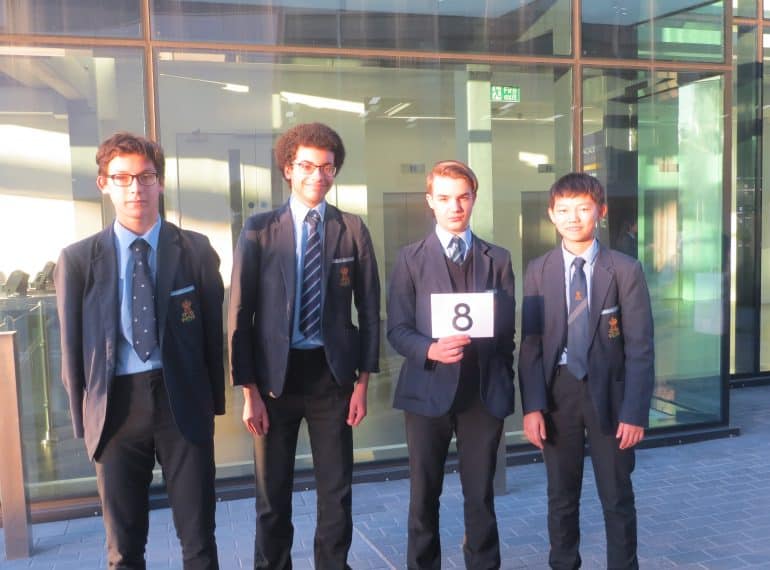

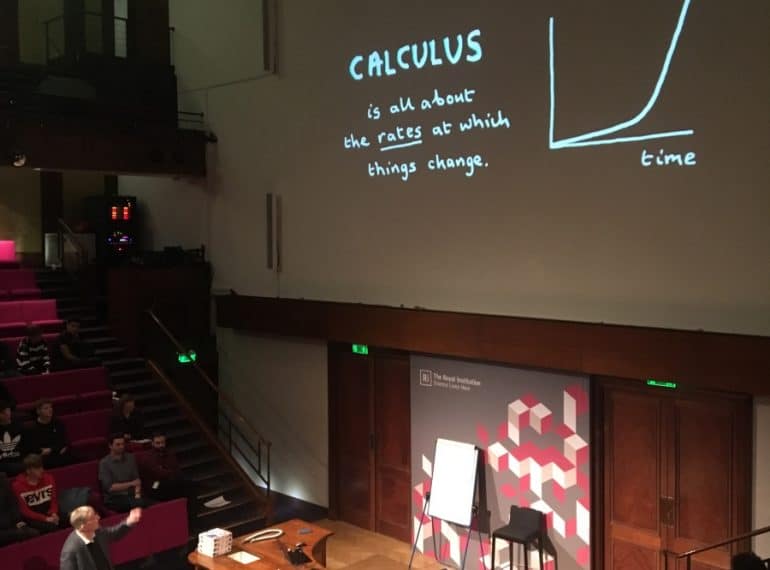
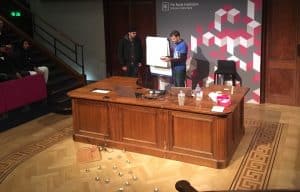 The Year 12 pupils headed off to the Royal Institution in central London for Maths Fest 2019 – a Mathematics festival for schools designed to inculcate a passion for the subject among young people. The event is the brainchild of mathematicians and speakers Matt Parker and Rob Eastaway.
The Year 12 pupils headed off to the Royal Institution in central London for Maths Fest 2019 – a Mathematics festival for schools designed to inculcate a passion for the subject among young people. The event is the brainchild of mathematicians and speakers Matt Parker and Rob Eastaway.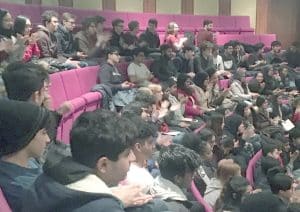 Science presenter Steve Mould then showed the audience 2D and 3D shapes of constant width that are not circles or spheres, before somewhat precariously riding a skateboard to demonstrate how easily he could slide along with these unique shapes. His most famous discovery is “self-siphoning beads”; a string of metal beads strung together on a chain, which, when released from its container, seems to defy gravity and move upwards before falling to the ground.
Science presenter Steve Mould then showed the audience 2D and 3D shapes of constant width that are not circles or spheres, before somewhat precariously riding a skateboard to demonstrate how easily he could slide along with these unique shapes. His most famous discovery is “self-siphoning beads”; a string of metal beads strung together on a chain, which, when released from its container, seems to defy gravity and move upwards before falling to the ground.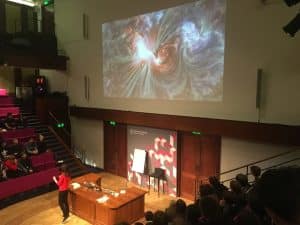 Astronomer Lucie Green discussed the sun – Ishveer Sanghera commented that he particularly enjoyed her application of Mathematics to the solar system, including calculating how much longer the sun would burn for.
Astronomer Lucie Green discussed the sun – Ishveer Sanghera commented that he particularly enjoyed her application of Mathematics to the solar system, including calculating how much longer the sun would burn for.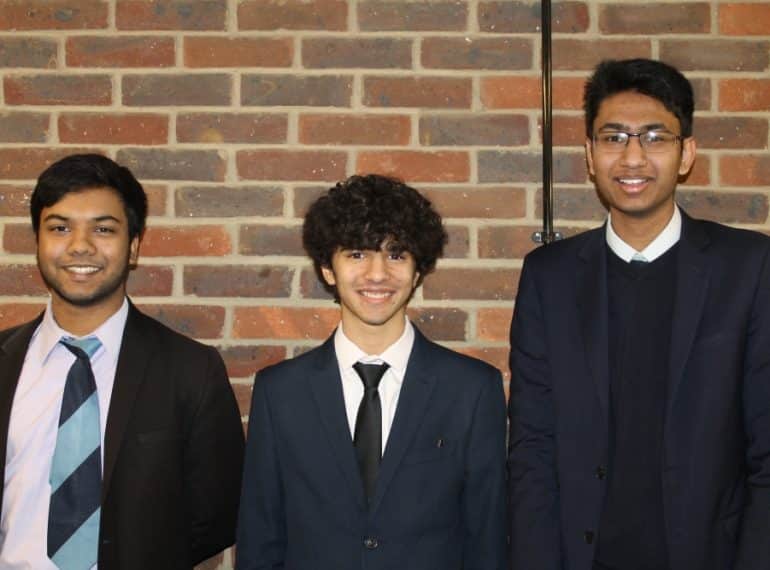
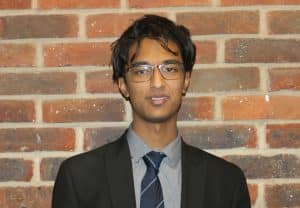 Assistant Head of Mathematics Wendy Fung congratulated the three on their achievement in the first round and wished them success in Round 2.
Assistant Head of Mathematics Wendy Fung congratulated the three on their achievement in the first round and wished them success in Round 2.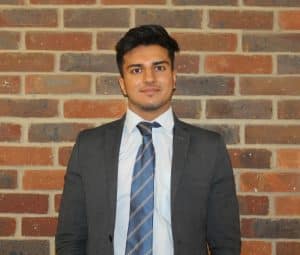 Thirteen boys were each awarded a merit certificate for scores of 35 and above. Saruthan Seelan (pictured above right) in fact achieved double this total, with his score of 70 out of 100 making him the best in Year 12.
Thirteen boys were each awarded a merit certificate for scores of 35 and above. Saruthan Seelan (pictured above right) in fact achieved double this total, with his score of 70 out of 100 making him the best in Year 12.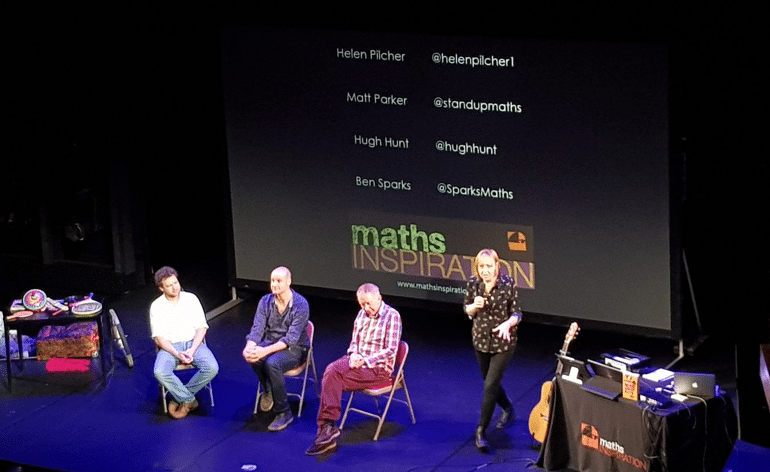
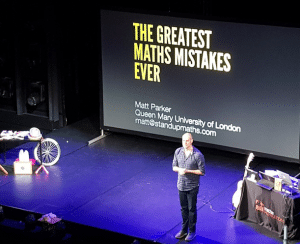 Matt Parker, who describes himself as a “stand-up mathematician”, related some of the mathematical errors set out in his book, Humble Pi. Some, he said, were simply amusing or embarrassing, such as McDonalds miscounting the combinations of meal deals and Pepsi underestimating the value of a fighter plane. However, he pointed out that some other mistakes he had come across could have more serious consequences, such as an aeroplane running out of fuel because the wrong units had been used to fill the tanks.
Matt Parker, who describes himself as a “stand-up mathematician”, related some of the mathematical errors set out in his book, Humble Pi. Some, he said, were simply amusing or embarrassing, such as McDonalds miscounting the combinations of meal deals and Pepsi underestimating the value of a fighter plane. However, he pointed out that some other mistakes he had come across could have more serious consequences, such as an aeroplane running out of fuel because the wrong units had been used to fill the tanks.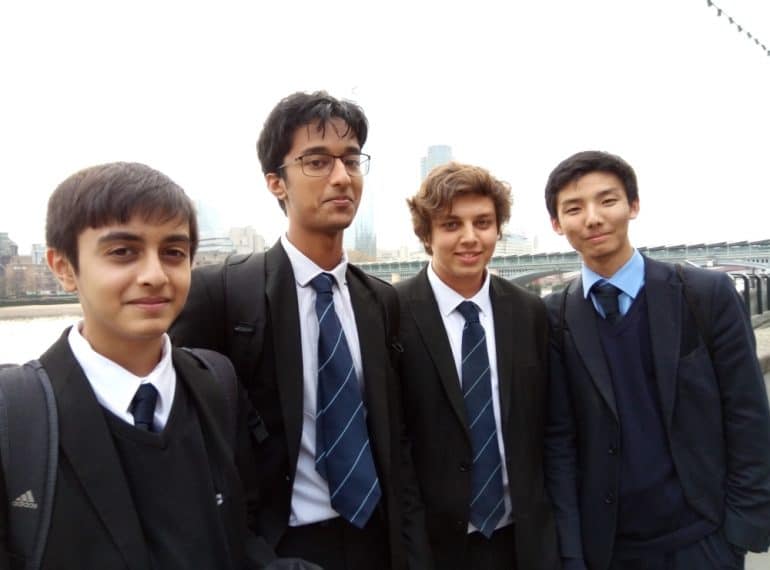

 QE’s Head of Mathematics Jessica Steer said: “Each lecture was inspiring in its own way and has encouraged the boys to delve deeper into the topics they found most engaging on the day. These lectures are a very good way of introducing branches of Mathematics and ways of mathematical thinking not in the curriculum and of showing the range of applications to which the subject can be applied.”
QE’s Head of Mathematics Jessica Steer said: “Each lecture was inspiring in its own way and has encouraged the boys to delve deeper into the topics they found most engaging on the day. These lectures are a very good way of introducing branches of Mathematics and ways of mathematical thinking not in the curriculum and of showing the range of applications to which the subject can be applied.”